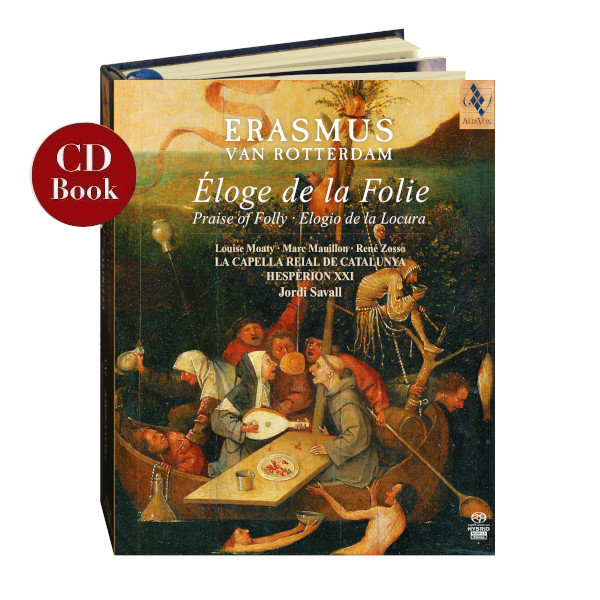ERASMUS
Éloge de la Folie
Hespèrion XXI, Jordi Savall, La Capella Reial de Catalunya
29,99€
AVSA9895
- Jordi Savall
- La Capella Reial de Catalunya
- Hspèrion XXI
Erasme Erasmus was always ready to take up his pen against injustice, wars, fanaticism and even the moral decline of his own Church. The “reign” of Erasmus, whose authority at the beginning of the 16th century extended throughout Europe, triumphed without the need for violence by virtue of spiritual force alone. As Stefan Zweig writes “For one wonderful moment, Europe was united by the dream of a shared civilization, which, thanks to its unity of language [Latin], religion and culture, would put an end to its dreadful, age-old discord. The memory of that unforgettable bid for unity will forever be linked to the personality and name of Erasmus. His ideas, his hopes and his dreams captured and held the imagination of Europe for a brief span in its history, and it is to his great chagrin, as well as ours, that such pure intentions turned out to be only a short interlude in the cruel tragedy of humankind.”
It is above all thanks to the beautiful portraits painted by Holbein, Dürer and Quintin Metsys, as well as the author’s youthful work, In Praise of Folly, that Erasmus of Rotterdam remains imprinted on our cultural memory. His immense output and his life, previously known only to a handful of specialists, began to be more widely studied and disseminated in the early years of the 20th century, and it was thanks to various essays, in particular that of Stefan Zweig, Triumph und Tragik des Erasmus von Rotterdam (published in Germany in 1934, in the United States in 1934 (under the title Erasmus of Rotterdam), in France in 1935, in Italy in 1935, etc.), that the wider public began to be aware of the true dimension of this great traveller and impassioned seeker after dialogue and peace: in his Querela pacis he proclaimed: “The whole world is the common fatherland of all” at a time when Europe was torn by bloody conflicts. He saw only absurdity in the hatred that pitted English, German, Spanish, Italian and French against one other.
Erasmus was always ready to take up his pen against injustice, wars, fanaticism and even the moral decline of his own Church. The “reign” of Erasmus, whose authority at the beginning of the 16th century extended throughout Europe, triumphed without the need for violence by virtue of spiritual force alone. As Stefan Zweig writes “For one wonderful moment, Europe was united by the dream of a shared civilization, which, thanks to its unity of language [Latin], religion and culture, would put an end to its dreadful, age-old discord. The memory of that unforgettable bid for unity will forever be linked to the personality and name of Erasmus. His ideas, his hopes and his dreams captured and held the imagination of Europe for a brief span in its history, and it is to his great chagrin, as well as ours, that such pure intentions turned out to be only a short interlude in the cruel tragedy of humankind.”
+ information in the CD booklet
JORDI SAVALL
Bellaterra, Autumn 2012
Translated by Jacqueline Minett







Share